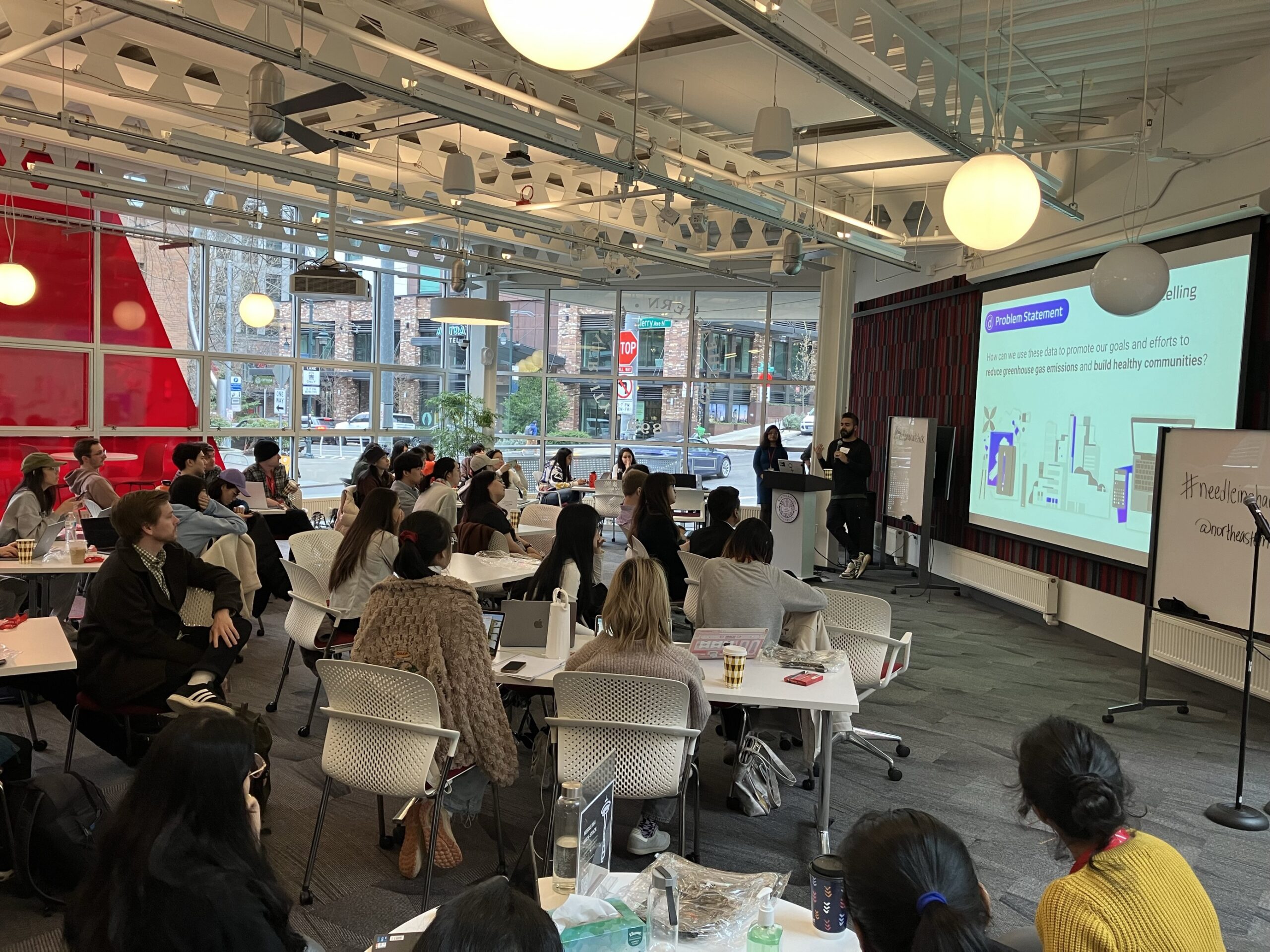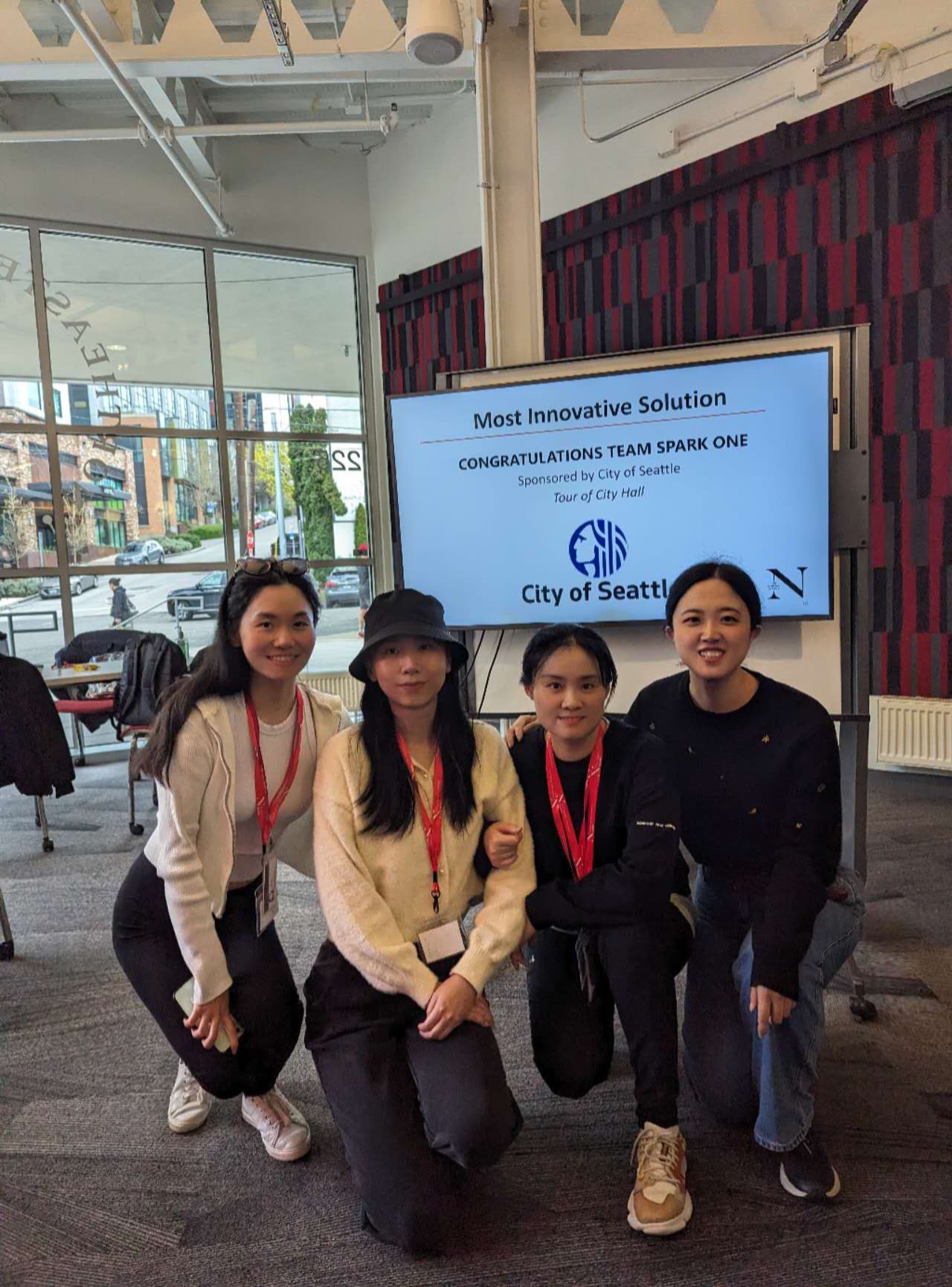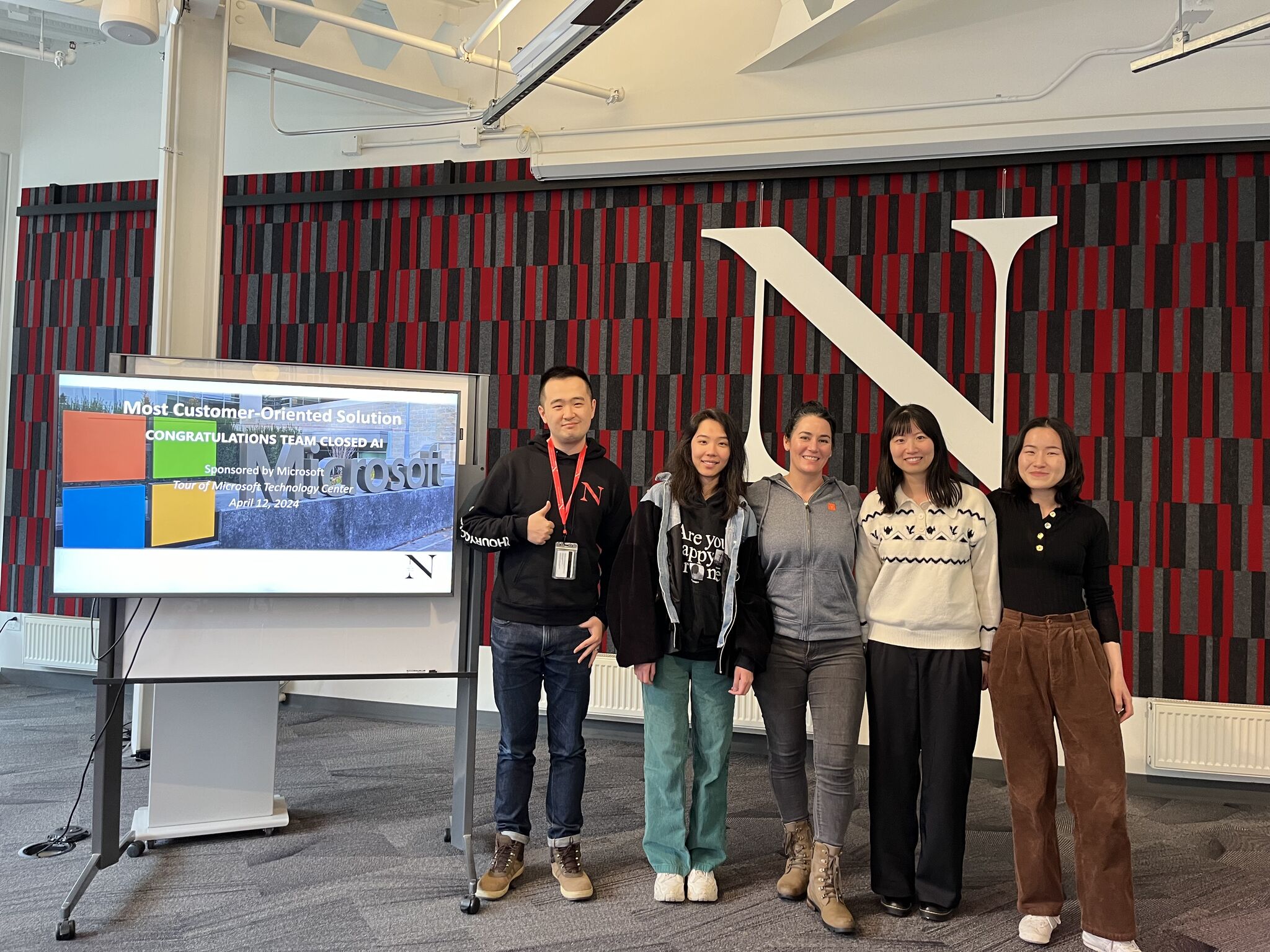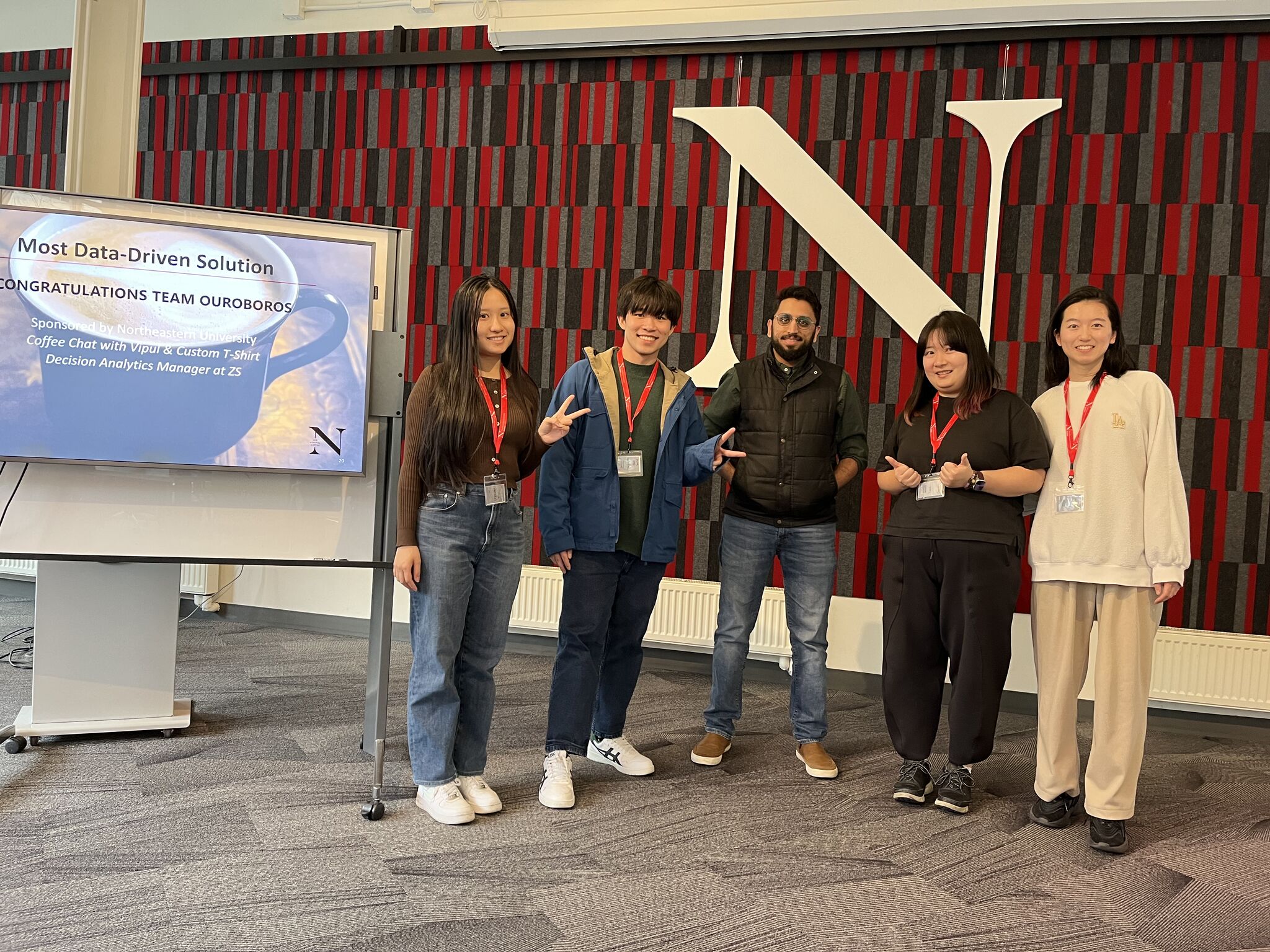
On March 22, City of Seattle staff joined graduate students and faculty at Northeastern University to kick off the “Needle in a Hack Stack” Hackathon competition at Northeastern’s campus in the heart of South Lake Union. The hackathon presented students with a set of problem statements to choose from to analyze Seattle’s Building Energy Benchmarking data, available as a series of datasets on data.seattle.gov. The challenge is aligned with the City’s efforts to reduce greenhouse gas (GHG) emissions from buildings and ensure healthy and sustainable communities for all.
Students who participated shared on LinkedIn:
“My first Hackathon! Experience was incredibly positive. I would definitely participate again and hope more students, especially our #COE #InformationSystem #InformationSystemBridge classmates will come to experience it!”
– Muyun Ji
“Embracing challenge was the key. We dived deep into uncharted territories, focusing on end-user needs and pushing through the struggles of data analysis. Our perseverance paid off, delivering a result that brought unexpected rewards.”
– Chunyun Zhang
“In our team, everyone got their hands dirty with every step like in a small startup. We learned by doing and gained an immersive experience of going through a full product development cycle that involves understanding the market, the user, the technology, and how these elements integrate to create a viable product…presenting our project was like pitching to potential investors. They listened, questioned, and challenged us. We had to stand strong, articulate our ideas, and adapt on the fly. That’s what makes or breaks a project.”
– Jiaying Lai
Ani Krishnan from the Office of Sustainability and Environment and Steve Barham, Janis Jordan, and Sawyer Junger from Innovation & Performance kicked off the event, mentored teams throughout the day, provided feedback, and rated the presentations. Many teams continued working late into, and in some cases, throughout the night. Three finalist groups were selected to present to a judging panel the following day.
“Collaboration and partnerships like the Needle in the Hack-Stack are amazing ways to leverage our community’s creativity and data skills to address complex, multi-dimensional challenges like climate change,” said Steve Barham. “It was exciting to see these teams use public data, understand the context, and embrace the challenge in such a short amount of time.”
In Seattle, buildings are responsible for more than a third of our city’s greenhouse gas emissions. These emissions pollute our air and accelerate climate change, which disproportionately harms local Black, Indigenous, and People of Color (BIPOC) communities. Seattle’s Benchmarking Program requires owners of non-residential and multifamily properties (20,000 square feet or larger) to track and report building performance annually to the City of Seattle. These reports are available on Seattle’s Open Data portal and viewable in an interactive map.
Participants were encouraged to connect Building Energy Benchmarking Open Data with other data sources, particularly the Seattle Race and Social Equity Index. Like at the One Seattle Open Data Hackathon last December, most of the participating teams chose to incorporate equity analysis into their work.
Seattle is committed to advancing how we collect, use, manage, communicate, and lead with data to improve equity and drive better outcomes for residents. In December, Mayor Harrell announced the One Seattle Data Strategy, a three-year effort that focuses on connecting currently siloed efforts, scaling up prior successes, and empowering community to use public data.
Kudos to the three winning teams:
- “Most Innovative Solution” was awarded to Team Spark for their analysis of the data quality for the Building Emissions Performance Standard (BEPS) Program. The team will be rewarded with a tour of City Hall with Mayors Office and Innovation & Performance Staff. We look forward to meeting Xin Geng, Jenny (Chenyi) Huang, Miranda Lyu and Muyun Ji again.

- “Most Customer-Oriented Solution” was awarded to Team Closed AI, who transformed their idea into an eco-dashboard and app prototype aimed at helping Seattle residents better understand and manage their electricity usage. Congrats Zhiwei Zhou, Chunyun Zhang, Maizhou (Marta) Yuan and Jiaying Lai.

- “Most Data-Driven Solution” was awarded to Team Ouroboros for their analysis of trends in energy use that identified areas to focus efforts to reduce emissions in an equitable way. Congratulations to Yiwen Wang, Jiajie He, Peiwen Zhong, and Yijia Ma!

The hackathon was an opportunity for graduate students to get real-world experience applying their data analytics expertise to a public policy issue. At the same time, City of Seattle staff received valuable analysis of existing data.
Seattle recently adopted a new Building Emissions Performance Standard (BEPS) Policy, signed by Mayor Harrell in December 2023, which sets emissions targets that Seattle’s largest existing buildings will meet over time to improve energy efficiency and reduce climate impacts. Seattle’s Benchmarked Buildings data is a critical foundation from which these targets are derived. BEPS is projected to reduce building emissions 27% by 2050, making it one of the most impactful climate actions for Seattle. By taking a deeper dive into available data, hackathon participants identified alternate ways to complement this important policy.
The Needle in a Hack-Stack hackathon was hosted by Northeastern University. Founded in 1898, NEU is renowned for its experiential learning model, high-impact research, deep partnerships, and worldwide reach. The Seattle branch offers advanced degrees in computer science, data analytics, and professional studies. The City appreciates NEU staff Amrita Bagwe, Jaren Walker, Megan Sykes, and Michael Pappalardo for organizing and hosting the event and is looking forward to future collaboration.